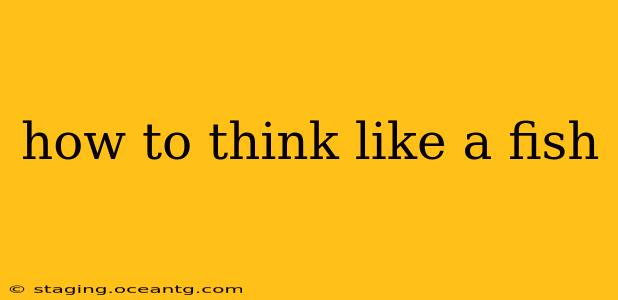Thinking like a fish isn't about literally becoming a fish; it's about adopting a different perspective, understanding the world from a completely different sensory and environmental context. It's about shifting your mindset to embrace a more intuitive, reactive, and environmentally-driven way of experiencing life, much like aquatic creatures. This involves understanding their limitations, strengths, and the unique challenges their environment presents. This article will explore various aspects of this concept, answering common questions about how to approach this unique thought experiment.
What Does It Mean to "Think Like a Fish?"
This phrase is often used metaphorically. It encourages us to step outside our human-centric worldview and consider alternative perspectives, particularly in problem-solving and understanding different situations. Thinking like a fish focuses on understanding the environment from a fish's perspective—its limitations and advantages within that environment. This involves considering the following:
-
Sensory perception: Fish rely heavily on senses different from ours. Their sense of smell, lateral line system (detecting vibrations), and vision adapted to underwater environments are crucial to their survival. Thinking like a fish involves imagining the world through these lenses.
-
Environmental awareness: A fish's world is constantly changing – currents, water temperature, oxygen levels, predators, and prey are all factors constantly considered. To think like a fish is to be aware of these subtle and dynamic environmental influences.
-
Instinctive behavior: Fish exhibit instinctual behaviours driven by survival – schooling, migration, feeding responses. Understanding these behaviours can provide insights into their decision-making processes.
-
Communication: Fish communicate in ways different from humans – using pheromones, body language, and even sounds. Considering these communication methods expands our understanding of their interactions.
How Can I Develop This Way of Thinking?
Developing this unconventional perspective requires a combination of empathy, imagination, and knowledge:
-
Learn about fish: Understanding fish biology, behavior, and ecology is fundamental. Explore different species, their habitats, and the challenges they face.
-
Immerse yourself in the underwater world: Watch documentaries, visit aquariums, or even try scuba diving. Direct experience provides invaluable insights into the sensory experience of being underwater.
-
Practice empathy: Try to understand the fish's perspective. What are its needs? What are its challenges? How does it perceive its surroundings?
-
Engage in creative thinking: Imagine yourself as a fish navigating its environment. How would you respond to different stimuli? What decisions would you make?
What Are the Benefits of Thinking Like a Fish?
Thinking like a fish, or employing this metaphorical perspective, offers several benefits:
-
Problem-solving: It encourages creative solutions by approaching problems from unconventional angles.
-
Empathy and understanding: It fosters appreciation for different perspectives and promotes understanding of diverse life forms.
-
Improved decision-making: By considering various factors and perspectives, it leads to more informed and well-rounded decisions.
-
Enhanced creativity: It opens up new avenues for creative expression and exploration.
What Are Some Examples of "Thinking Like a Fish" in Everyday Life?
The concept transcends the literal underwater world. It applies to problem-solving in many contexts:
-
Business: Understanding your competitors' strategies and market conditions.
-
Personal relationships: Seeing things from another person's perspective and understanding their motivations.
-
Environmental issues: Appreciating the interconnectedness of ecosystems and the impact of human actions.
Why Is It Important to Understand Different Perspectives?
Understanding different perspectives is crucial for building empathy, improving communication, and promoting cooperation. In a world increasingly interconnected, the ability to step outside of our own worldview and understand other viewpoints is essential for effective problem-solving and building harmonious relationships.
By embracing the metaphorical concept of "thinking like a fish," we unlock new ways of thinking, fostering creativity, empathy, and problem-solving skills applicable to many facets of life beyond the aquatic realm.
